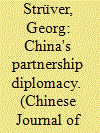|
|
|
Sort Order |
|
|
|
Items / Page
|
|
|
|
|
|
|
| Srl | Item |
| 1 |
ID:
131995


|
|
|
|
|
| Publication |
2014.
|
| Summary/Abstract |
Within the scholarly debate on the current power transition in the international system, particular importance is attached to China's economic rise and the global shifts it is bringing forth in material primacy. A thorough understanding of these shifts in the relative distribution of power, however, requires leaving the narrow path of material capabilities and looking at normative accounts as well. Taking up this challenge, the article focuses on the political dimension of China's rise by exploring the country's alignment with South American governments along two dimensions: the convergence of their foreign policy ideas and the provision of diplomatic links facilitating their cooperation and coordination in global politics. The empirical analysis depicts a nascent global agenda forming between China and certain South American countries and shows that, along with growing levels of foreign policy compatibility, China has also advanced its diplomatic inroads into the region, particularly at the level of bilateral relations. Taking these developments as a whole, it is suggested that China has gained international attraction in terms of its visions of global order and as a potential political partner throughout the region. The article concludes with a discussion of the findings in light of the ongoing relative shifts in the distribution of global power beyond material primacy, and the prospects for China's further political rise.
|
|
|
|
|
|
|
|
|
|
|
|
|
|
|
|
| 2 |
ID:
152313


|
|
|
|
|
| Summary/Abstract |
While it was impossible during much of the Cold War period to think about international cooperation absent the term ‘alliances’, over the past two decades strategic partnerships have occupied a central position in many states’ diplomatic toolkit. This article sheds light on such international alignment decisions by examining the case of China’s partnership diplomacy during the period 1990 to 2015. Theoretically, the analysis draws on scholarly insights into alliance formation and international cooperation to formulate two broad assumptions about partner choice which are based on interest-driven and ideology-based rationales of alignment. Binary regression estimations highlight the importance of economic interests in explaining partnership onset. In contrast to common arguments about alliance formation, partnerships seem unlikely to be driven by shared domestic ideologies. In fact, bilateral partnerships help to bridge ideological gaps and to enable, at least in the case of China, the respective partners’ pursuit of economic gains and diplomatic preferences. With regard to the presumed payoffs of partnerships, the analysis further suggests that partnerships mean more to bilateral relations than purely nominal titles. Rather, they have measurable impact on partners’ economic relations as well as on convergence regarding their views on the international order. China’s growing spectrum of partnerships, therefore, expands the country’s potential to exert impact on international political outcomes.
|
|
|
|
|
|
|
|
|
|
|
|
|
|
|
|
| 3 |
ID:
158848


|
|
|
|
|
| Summary/Abstract |
According to conventional wisdom, strategic natural resources like oil are harmful to international peace. Nonetheless, there is little comparative work on the link between resources and interstate conflicts. Analyzing the impact of oil on militarized interstate disputes on the dyadic level of analysis for the period from 1946 to 2001, this paper shows that oil in fact influences the conflict potential between countries. Results of logistic regressions suggest that absolute oil abundance as well as oil dependence increase the risk of dispute involvement. We find that in particular oil production, oil reserves, oil dependence, and oil exports are associated with a higher risk of initiating conflict while countries enjoying large oil reserves are more frequently the target of military actions. Furthermore, our analysis indicates that the presence of large oil deposits also increase the intensity of international disputes. Relative measures of oil abundance such as per capita oil production, in contrast, do not affect countries’ dispute proneness. Increased militarization, the internationalization of intrastate violence, the indulgence of an oil-dependent world community and so-called “classical resource wars”—rather than domestic political mechanisms inherent to the rentier state—are likely to explain our findings.
|
|
|
|
|
|
|
|
|
|
|
|
|
|
|
|
| 4 |
ID:
131998


|
|
|
|
|
| Publication |
2014.
|
| Summary/Abstract |
Rising powers have attracted tremendous interest in international politics and theory. Yet the ways in which secondary powers strategically respond to regional changes in the distribution of power have been largely neglected. This article seeks to fill this gap by presenting a systematic comparative analysis of the different types and causes of contestation strategies undertaken by secondary powers. Empirically, it focuses on two contentious regional dyads in East and South Asia, exploring how structural, behavioral, and historical factors shape the way in which Japan and Pakistan respond, respectively, to China's and India's regional power politics. The article concludes that the explanatory power of these factors depends on the respective secondary power's particular context: in the case of Japan, China's increasingly assertive regional behavior combined with a nontransparent military buildup has invoked the most significant strategic shifts, while in the case of Pakistani contestation, an increasing threat perception in the late 1980s led to the return to a pre-1971 revisionist agenda, whereas the overt nuclearization in the late 1990s mitigated India's growing conventional superiority and enabled Islamabad to replace soft balancing with more direct means of hard balancing.
|
|
|
|
|
|
|
|
|
|
|
|
|
|
|
|
|
|
|
|
|